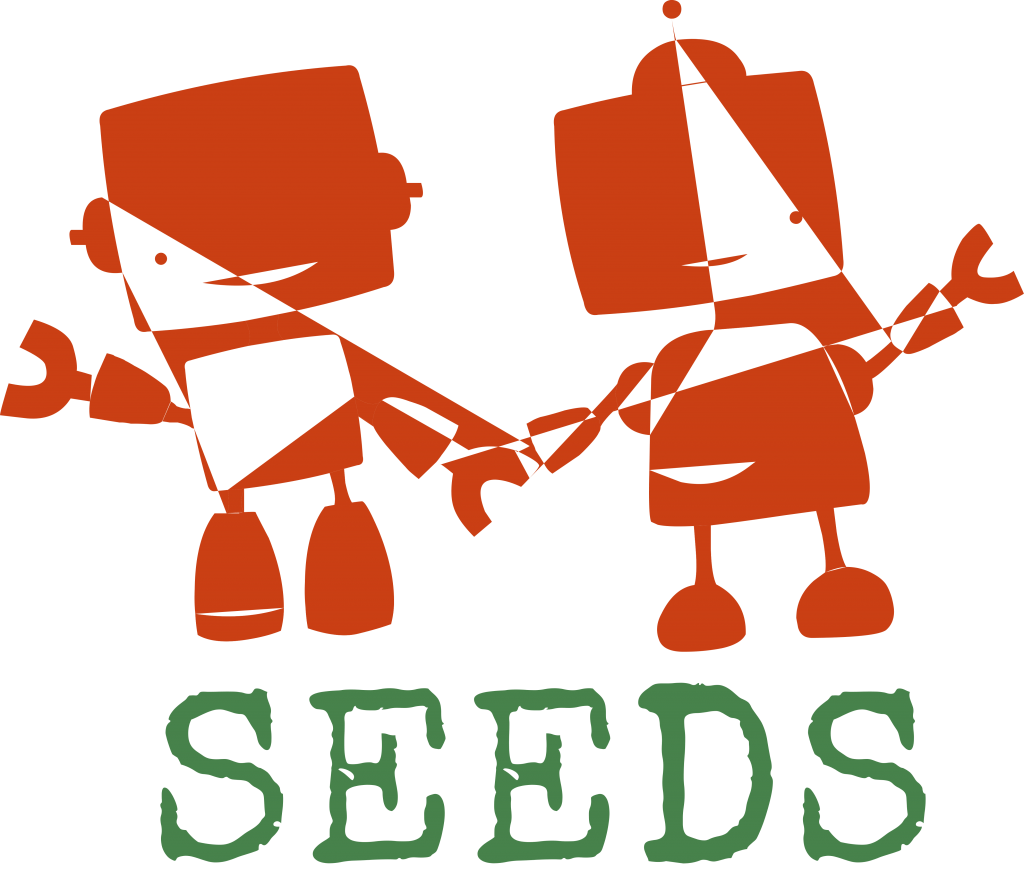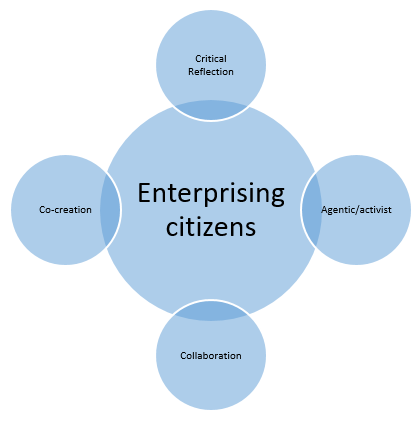


The SEEDS Project

The project “Social Entrepreneurship Empowering Development in preSchools” (SEEDS) was a two year project, running from September 2018 to October 2020. It was funded by the European fund Erasmus+ Strategic Partnerships for School Education.
The main goal of the project was to develop pedagogical methods for preschool education, to support early learning of relevant skills like entrepreneurial mindsets, digital media and to insure social inclusion of all children in this learning.
SEEDS aims to equip children from an early age, with the seeds for the development of an entrepreneurial compass in interplay with digital media. This compass starts from the individual as a citizen and builds on their particular skills and competences to enhance the four points of the compass; critical reflection, collaboration, co-creation and agency.
CONCRETE OBJECTIVES IN THE PROJECT
- TEST existing digital and analogue tools based on inclusive pedagogical principles that support children’s development of social entrepreneurial mindsets and competences.
- TRAIN pre-school educators and children through active and involving learning and experimenting development processes.
- ENGAGE local stakeholders in experimenting development of pedagogical practices for social entrepreneurship and inclusion.
- DEVELOP a European preschool pedagogy on social entrepreneurship and inclusion in a digital era.
- EVALUATE the learning results of the participating children and preschool educators to ensure the quality of the developed outputs.
- PHRASE Recommendations for a social entrepreneurial and digital pedagogical framework for European preschools.
TARGET GROUP
- Preschool children aged 3-6 . Focus on vulnerable children, with unequal opportunities of accessing and interacting with technology, at risk of missing out of relevant learning and participation in social groups and the local community.
- Trained preschool educators working with children aged 3-6.
- Decision makers/policy officials, organisations, research institutes and educational institutions working with preschools.
ENTREPRENEURIAL MINDSET
The entrepreneurial mindset and skills developed in the project focus on a broad understanding of entrepreneurship. Entrepreneurship in these terms is about creating value – social, environmental, cultural or economic. Entrepreneurial skills and mindsets has been developed through innovative and creative processes that allowed for experimentation, investigation and identification of potential value in a close relationship with other people regardless of age, gender and ethnicity (WEF: New Vision for Education; New European Skills Agenda of 2016; Thestrup & Robinson 2016).
Preschool education is an important starting point for equipping children with entrepreneurial competences and mindsets, because attitudes, values, ways of thinking and behaving are molded early in life. Preschool is a natural environment for working with creative, process and action based education methods, due to the pedagogical principles and methods used in preschools. Early development of essential competences will form a solid basis for entrepreneurial learning in further education (Ehrlin 2015). The issue of preparing our children for the future is shared in Europe. The challenges and factors that influence our societies do not stop at national borders. By developing transnational global methods and principles practitioners can be inspired to innovate their preschool education praxis and build essential competences among educators and children.
A EUROPEAN PRESCHOOL PEDAGOGY
It is a global concern to prepare children for the 21st century society with its rapid digitalization of work processes, increasing use of complex technology, globalisation and birth of new job types. The World Economic Forum (WEF) indicates that within the next 10-20 years, up to 50 percent of the jobs we know today will disappear. There is a need for a future skilled work force with strong creative, innovative skills that can operate in a co-creative learning economy. They need to learn to think originally and creatively, master the newest technology, be critical thinkers and have a global and entrepreneurial mindset. This puts pressure on education systems to equip children for a life as active participants in society and in particular, pay attention to inclusion of vulnerable children. As formulated in the UNs Global Sustainable Development Goals, we must “leave no one behind”, and ensure that all children have access to relevant learning, skills and participation in society.
Innovation and modernisation of education and training are key priorities in several flagship initiatives of the Europe 2020 strategy like the “Agenda for New Skills and Jobs” and “the Digital Agenda”. For European preschools, teaching methods and curriculums are under pressure to meet the needs of a digitalised global society and educators are required to develop their own skills for creativity, innovation, social responsibility, cooperation and global understanding as well as the childrens’. ICT is increasingly used in European preschools, but the way technology is used and ‘consumed’ often has pedagogical limitations. If we are to equip our children for the challenges to come there is a need to develop and integrate technology in preschools that build on children’s active playful learning processes and general development that involve physical, motor skill development and social dynamics.
The project has developed a European preschool pedagogy for social entrepreneurship, mindset and digital media use. It has been contained in a collection of resource materials that will suggest educational guidelines and principles, methods and themes, best practice and a concrete toolkit that faciliate social entrepreneurship, mindsets, key entrepreneurial competences and social inclusion. The resource materials has been developed and tested across so-called local experimenting communities that has facilitated co-creative development between partners, local preschools, children and key stakeholders in the 4 partner countries. Based on local developments and transnational exchange and test of methods, a generalized, European pedagogy has been developed, that is be transferable across preschools in European countries. Read more about the resource materials here.
Based on the developed pedagogy and resource materials, the project partners has formulated a report with recommendations based on the project experiences and results. Read more about the recommendations here.

THE PROJECT METHODOLOGY
Transnational experimenting development of a European Pedagogy:
The methodology used in the project for the testing and development of the outputs draws on an ethnographic approach which is qualitative and centered around participatory, iterative action-based research. The partners has, taking account of the local context, each design and pilot appropriate methods together with preschool educators and children. Following the overall participatory design approach of the project, the output development has been implemented as contextual inquiry (Beyer & Holtzblatt, 1998). Researchers has taken into account children’s and teacher’s every day preschool activity and needs by observing, interviewing and analyzing at the very beginning of the project. Using existing technologies, the toolkit developed by DIMEB, and involving local stakeholders, the partners engage the local communities of learners in active experimentation to encourage and promote development of inclusion and entrepreneurial mindsets and competences both of the adults and the children. Each national setting has exchanged and tested methods as a basis for a shared pedagogy, with synergies between the project outputs and the local contexts. These pedagogical methods and tools has been shared and discussed through a joint online platform (E-Twinning) and at workshops where all the partners were present. In this way customization of learning designs and outputs has been developed and adjusted in collaboration to adapt them for suitability in different contexts and cultures. Also, this has provided a real opportunity to map and articulate teaching of entrepreneurial mindsets and competences in practice.
The experimenting community:
The very cultural and pedagogical core of an experimenting community is the experiment itself and the will to ask questions, where there might not yet be answers, at least for the participants in the experimenting community. To support and nurture the development of entrepreneurial mindsets and competences in learning settings with preschool aged children the consortia has developed inclusive action-learning environments that were based on experimenting communities of people. There are no particular physical requirements for setting up an experimenting community. What is important is the agreement of all involved that the physical space is where the experimenting community will interact; children, educators and local stakeholders along with the tools that exist as well as ones that are introduced to the community. Both children and adults learn and go through entrepreneurial processes together and hierarchies are left outside the space to allow participation on equal footing by all in the activities and experiments. This setting, which aims to foster a place for inter-generational and social inclusion through experimentation, collaboration, adaptation and implementation was a central element for the project framework. There is no one expert with all the knowledge, or all the answers.
The experimenting learning community:
However establishing a true experimenting learning community takes time and sensitivity. It takes time to establish trust, a feeling of value and respect for everyone in the community, an openness towards other people (whatever age, sex, or ethnic group) and an openness towards the outside world understood as analogue and digital. These communities are open in the sense that all materials, narratives, media and technologies can be connected, changed and re-mixed into new constructions and new narratives. Narratives are important as a form of communication and as a relational link between the objects and the narrator to develop new worlds and imagine things not yet imagined. In the beginning the communities focus on who they are and where they are and establish ground rules for their ‘being’. Language is an important driver for building mindsets and critical thinking and conversations, discussions and philosophical conversations between children and adults will be central. This inclusive design brought into an action-learning context has the potential to motivate all those involved in their own learning and as a result in the development of related skills (Thestrup, Andersen, Jessen, Knudsen & Sandvik 2015; Nottingham & Nottingham 2017).
CHILDREN'S VOICES
To get the best results, it’s important to ensure that the children have a voice in the project. This means giving them space to express their views, thoughts and ideas through activities like interviews or conversations.
